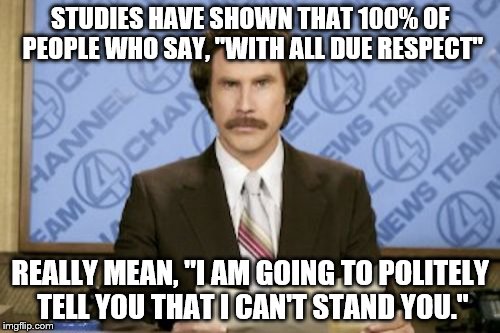

We’d rather know what the case is about, and quite frankly, it’s more fun when we do, because then we can have an intellectual discussion with counsel. Think of it this way: Why would we want to take the bench without having read your briefs? We admit this has occurred a handful of times, and when it has, we felt embarrassed, our ignorance exposed. The vast majority of bench officers take their work seriously.

What you are doing is accusing judges of not having done their job. The preposition ‘if’ doesn’t soften the blow at all. “If you had read my papers…” This means, “Judge you haven’t read my papers.

Do you really expect these words will convince a judge to rule in your favor? If you take away anything from this article, take away this: never say, “with all due respect.” More important, there is no percentage in telling judges they’re stupid. To say those words is to call the judge a moron, to imply that you have no respect for the judge whatsoever. “With all due respect.” This prepositional phrase constitutes the third rail of courtroom rhetoric. In fact, certain sentences and clauses, if strategically employed, will impress us.
All due respect how to#
So it is with court appearances, and while judges try to keep it together when counsel mangle their words, you will make a better impression if you know how to say things. True salts would say, “Pick up the line on the port side.” If you’re sailing and say, “Pick up the rope on the left side,” you’ve exposed yourself as a novice. Every line of work contains its own particular patois, its series of code words and phrases.


 0 kommentar(er)
0 kommentar(er)
